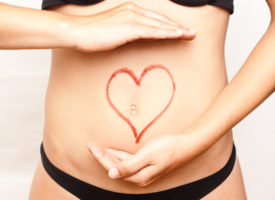In 2011, Michael Hurst was scheduled for surgery to remove a portion of his colon. Diagnosed at age 21 with ulcerative colitis, he had suffered with bloody diarrhea, gas, and severe abdominal pain for more than 12 years. Despite treatment with intense regimens of antibiotics, prednisone, and other medications, his flare-ups worsened, and his doctors told him surgery was his only option.
Three days before he was scheduled to check into the hospital, Michael learned about fecal transplant as a treatment for ulcerative colitis. To make a long story short, he cancelled his surgery, made a diluted infusion of stool donated by a healthy friend, and used an enema to self-administer this therapy. Michael’s “incurable” condition has been in remission ever since.
Fecal Transplant: “Icky” but Highly Therapeutic
Fecal transplant is an incredibly powerful therapy. The first recorded treatment was in 1958, when a patient with a life-threatening intestinal infection had an immediate and dramatic response. Nevertheless, for 50 years this highly effective therapy was ignored in favor of antibiotics. Now, thanks to the emergence of drug-resistant bacteria, antibiotics are losing their luster, and—despite the “ick factor”—fecal transplant is coming into its own.
The first significant clinical trial of this therapy was published recently in the New England Journal of Medicine. Patients with recurrent Clostridium difficile infections—which cause severe and painful diarrhea in millions of Americans and kill 14,000 every year—were treated with either the usual antibiotics or “infusions of donor feces” through a nasal feeding tube. After just one fecal transplant, 81 percent had rapid and complete resolution, and two-thirds of the non-responders were cured after a second infusion from a different donor. It was so much more effective than antibiotics, which had a 27 percent response rate, that the study was stopped early so all participants could receive this therapy.
Thousands of additional patients have reported treatment success with fecal transplant not only for ulcerative colitis and C. difficile infections but also Crohn’s disease, irritable bowel syndrome, and other difficult stomach problems. Australian researchers, for example, reported that 70 percent of patients with chronic fatigue had a positive response.
The Power of a Healthy Gut Microbiota
The power of this low-tech treatment, which simply introduces healthy bacteria into the intestinal tract, underscores the critical role of the human gut microbiota—the 100 trillion microbes that live in and on our bodies and are concentrated in the intestines.
Each of us has a unique microbial “community” that varies from one person to another based on diet, environment, genetics, age, and medical history. These variations influence intestinal health, resistance to infection and disease, metabolism, mood, and even weight. For example, the microorganisms in the guts of the lean people are quite different from those who are obese. And older people tend to have less diverse intestinal flora, which may be associated with some age-related health challenges.
Modern life is not kind to our gut microbiota. American doctors prescribe hundreds of millions of antibiotics every year, often for conditions they have zero chance of benefitting. Antibiotics kill good bacteria along with the bad, destroying the normal microbial balance and allowing pathogenic species to gain a foothold. Other factors that upset this balance include our highly processed, nutrient-deficient diet, laden with chemicals and antibiotic residues, and our obsession with cleanliness (e.g., the popularity of antibacterial soaps).
Almost all C. difficile infections are attributed to antibiotic use, and our dramatically increased incidence of allergies, asthma, eczema, digestive disorders, obesity, and autism are due at least in part to disruptions in the gut microbiota.
Eat Right…
You can protect your gut microbiota by eating more fermented foods, which contain a rich variety of beneficial bacteria to repopulate the gut. Yogurt, kefir, and other “sour” milk products have been recognized for their health properties since Biblical times. Sauerkraut and pickled vegetables also pack a therapeutic punch, as do kimchi, a Korean spicy pickled cabbage, and miso and tempeh, which hail from Japan.
Make prebiotics part of your regular diet as well. Prebiotics are indigestible carbohydrates that pass through the digestive system more or less intact—until they hit the large intestine, where they feed and nourish the resident bacteria. Soluble fiber in beans, legumes, oats, barley, flax, and other whole grains, as well as onions, garlic, asparagus, carrots, broccoli, kiwi, bananas, citrus, and berries all have excellent prebiotic properties.
…And Take Probiotic Supplements
I also recommend probiotic supplements. You probably know that probiotics help with symptoms such as gas, bloating, and constipation and are used to treat acute and antibiotic-related diarrhea and irritable and inflammatory bowel conditions. But dozens of additional benefits of probiotics have been reported in recent years for conditions as diverse as vaginal infections and nonalcoholic fatty liver disease to respiratory infections and weight loss. Probiotic supplements have even been shown to lower levels of stress hormones and improve symptoms of depression, anxiety, and anger.
Research on the human microbiome and the benefits of probiotics is rapidly expanding, and I’ll keep you posted as important findings emerge. But for now, I’ll tell you what I’ve been telling my patients for 35 years: Take a few billion bacteria and call me in the morning!
Recommendations for Nurturing Gut Microbiota
Make fermented and high-soluble-fiber foods, which are rich in pre- and probiotics, part of your regular diet. Consider adding probiotics to your daily supplement regimen. If you’re on an antibiotic, probiotics are a must—just make sure you take them three hours before or after taking the drug. Look for a product from a reputable manufacturer that contains both Bifidobacterium and Lactobacillus bacteria strains and take as directed. Good brands we use at Whitaker Wellness include Theralac and PearlBiotics.
To learn more about fecal transplant, visit thepowerofpoop.com. This website lists clinics offering the therapy, scientific resources, several success stories, and—not for the faint of heart—do-it-yourself instructions.


